His Love of India
Swami Vivekananda loved India from the core of his heart. He wrote to Haridas Viharidas Desai, the Dewan of Junagad (Gujarat), ‘My greatest fault is that I love my country only too, too well.’1 Having identified himself completely with India, India’s history, culture and aspirations, he was aptly called as ‘condensed India’. He thoroughly knew the ins and outs of the idea called India. Years later, when Romain Rolland, the illustrious French writer, wanted to know about India from Rabindranath Tagore, Tagore replied, ‘If you want to know India, study Vivekananda. In him, everything is positive and nothing negative.’ Sister Nivedita, his Irish disciple, after travelling and interaction with Swamiji, remarked, ‘Vivekananda is India encircling a body.’
While travelling on foot from one part of India to another, Swamiji discovered that foremost cause of India’s downfall is poverty. The nineteenth century of India that he travelled through was a land of hunger and squalor. The common mass of people that he met did not have one good meal a day. They were half-fed, half-clad, illiterate, deprived of treatment when they are victim of diseases and lacked proper housing for their living. Swamiji was deeply distressed by what he saw. Rightly did he say, ‘Food first and then religion. It is a sin to preach religion to a starving man.’
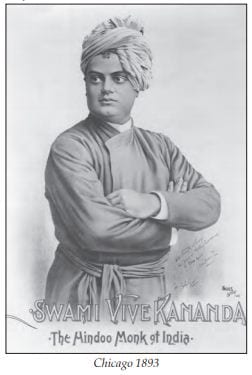
The day he delivered his historic speech in the Parliament of Religions in Chicago, he was invited by a wealthy person to his house. His Life describes:
On the very day of his triumph, he was invited by a man of great wealth and distinction to his home in one of the most fashionable parts of the city. Here he was entertained royally; a princely room fitted with a luxury beyond anything he could have conceived was assigned to him.
But instead of feeling happy in this splendid environment, he was miserable. Name and fame and the approval of thousands had in no way affected him; though sumptuously cared for, he was the same sannyasi as of old, thinking of India’s poor. As he retired the first night and lay upon his bed, the terrible contrast between poverty-stricken India and opulent America oppressed him. He could not sleep for pondering over India’s plight. The bed of down seemed to be a bed of thorns. The pillow was wet with his tears. He went to the window and gazed out into the darkness until he was well-nigh faint with sorrow.
At length, overcome with emotion, he fell to the floor, crying out, ‘O Mother, what do I care for name and fame when my motherland remains sunk in utmost poverty! To what a sad pass have we poor Indians come when millions of us die for want of a handful of rice, and here they spend millions of rupees upon their personal comforts! Who will raise the masses in India! Who will give them bread? Show me, O Mother, how I can help them.’2
This is only a sample of his intense sympathy and love for the Indian people.
Solving the Problems India Faces
Swami Vivekananda was born and died in British India. He passed away on 4 July 1902 at the age of 39 yrs 5 months and 24 days. Much has happened after that. India attained independence on 15 August 1947. And yet, after 68 years of independence, India has still not been able to solve problems of poverty, hunger and illiteracy.
Swamiji wanted India to take advantage of modern science and technology to solve her problems. He advised Jamshedji Tata to establish a strong industrial base in India and as a first step towards that, set up an Institute of Science and Technology. Responding to his advice Tata worked for bringing industrial activity in India. Later, Jamshedji Tata wrote a letter to Swamiji presenting his ideas about starting a research institute in science and the result was Indian Institute of Sciences in Bangalore which of course could take its shape after both of them had passed away.
Swamiji insisted on saying that the real strength of India lay in the masses. In his words,
Our aristocratic ancestors went on treading the common masses of our country under-foot, till they become helpless, till under this torment the poor, poor people nearly forgot that they were human beings. They have been compelled to be merely hewers of woods and drawers of water for centuries, so much so, that they are made to believe that they are born as slaves, born as hewers of wood and drawers of water.3
His warning in this connection is,
I consider that the greatest national sin is the neglect of the masses, and that is one of the causes of our downfall. No amount of politics would be of any avail until the masses in India are once more well educated, well fed and well cared for.4
To Swamiji, no plan to liberate the country would succeed unless the masses are utilized for that purpose. He was out of India for a number of years and when he met his younger brother Mohendra Nath Dutta in England in the year 1896, he wanted to know from him freedom movement of India. Mohendra Nath narrated to him Indian National Congress leaders negotiating with British government for larger representation on the administration of the country. Swamiji ridiculed the idea of getting power by begging. At that time Indian National Congress was composed by a few English educated professional people. Knowing such state of affairs Swamiji said, ‘Unless the masses are involved into the struggle, India would never be free.’
In this connection we should bear in mind an eminent statesman’s valuable utterance about Swamiji:
Words fail to express our gratitude towards Swamiji. We were blind, he has given us vision. We were under foreign bondage. He is the father of freedom movement of India. But for him, India would not have attained freedom. To Swamiji, caste division, specifying division of work prevalent in Hindu society as such is not bad. But in the course of time the so-called higher castes for establishing superiority generated hatred among men which Swamiji condemned vehemently. Hatred can be overcome by raising lower castes to the level of upper class. He wanted the Brahmins to work to that end so that transition might be peaceful. To prevent cultural decline, he wanted to deluge India with spiritual thought. He wanted to create a new social order by combining the best of spiritual tradition with the latest advancement in science and technology.
Swami Vivekananda had profound understanding of education—it’s ideal and the means. He observed that the system of education prevalent in British India—the time when he lived—was job-oriented education. He condemned this type of education
which does not help the common mass of people to equip themselves for the struggles of life, which does not bring out strength of character a spirit of philanthropy and the courage of a lion.5
So what should be the ideal of education? Swamiji said,
We must have life-building, man-making, character-making assimilation of ideas. If you have assimilated five ideas and made them your life and character, you have more education than any man who has got by heart a whole library.6
He said,
Education is the manifestation of perfection already in man.7
Sadly, the system of education as one finds in free India today falls short of manmaking education as advocated by Swamiji. He boldly declared,
We must have the whole education of our country, spiritual and secular, in our own hands, and it must be on national lines, through national methods as far as possible.8
As a man of foresight, far-sight and insight, Swamiji gave us a comprehensive view of education which if followed in practice would solve all fundamental problems of human beings everywhere. In fact his message regarding education is a challenge to humanity. If we accept it, we shall survive— materially and spiritually, if we discard it we will die physically and spiritually. Will humanity care to listen to the warning voice? Let those who have ears, let them hear and heed it, for themselves and the entire humanity.
The Spiritual Foundation of India
To Swamiji, religion is the backbone, the foundation, of Indian culture and life. In his words,
I see that each nation, like each individual, has one theme in this life, which is its centre, the principal note round which every other note comes to form the harmony. In one nation political power is its vitality, as in England, artistic life in another, and so on. In India, religious life forms the centre, the keynote of the whole music of national life; and if any nation attempts to throw off its national vitality—the direction which has become its own through the transmission of centuries—that nation dies if it succeeds in the attempt. And, therefore, if you succeed in the attempt to throw off your religion and take up either politics, or society, or any other things as your centre, as the vitality of your national life, the result will be that you will become extinct. To prevent this you must make all and everything work through that vitality of your religion.
Let all your nerves vibrate through the backbone of your religion. I have seen that I cannot preach even religion to Americans without showing them its practical effect on social life. I could not preach religion in England without showing the wonderful political changes the Vedanta would bring. So, in India, social reform has to be preached by showing how much more spiritual a life the new system will bring; and politics has to be preached by showing how much it will improve the one thing that the nation wants—its spirituality. Every man has to make his own choice; so has every nation. We made our choice ages ago, and we must abide by it.9
The life-blood of religion is spirituality. The neglect of this life-blood will virtually lead annihilation of the nation. To Swamiji, ‘Religion is the manifestation of divinity already in man.’10 Religion turns animal-man to God-man. It is not a cloth to be put on and put off at one’s sweet will. In his words,
He is an atheist who does not believe in himself. The old religion said that he was an atheist who did not believe in God. The new religion says that he is the atheist who does not believe in himself.11
If India is still grappling with numerous social, economic and other challenges even after 68 years of Independence it is because she has neglected her life-blood—spirituality. People have managed to forget his cautious warning: ‘Religion and religion alone is the life of India.’
He said,
Do you want that the Ganga should go back to its icy bed and begin a new course? Even if that were possible, it would be impossible for this country to give up her characteristic course of religious life and take up for herself a new career of politics or something else. You can work only under the law of least resistance, and this religious line is the line of least resistance in India. This is the line of life, this is the line of growth, and this is the line of well-being in India—to follow the track of religion.12
By ‘religion’ Swamiji meant the spirit of oneness and love that Vedanta teaches. Vedanta teaches that God is in everything. Man being the best product of creation, God may be fully manifested in human beings. Nara is Narayana. To quote Swamiji, ‘I worship that God whom ignorant people call human beings.’
Swamiji was indeed so deeply one with the Indian Mind that his whole thinking process was centred round India. India and Swami Vivekananda are eternally one. He is the very soul of India.
References
- CW, 8.309
- Life of Swami Vivekananda by His Eastern and Western Disciples, Advaita Ashrama,1.439
- CW, 3:192
- CW, 5,222-25
- CW, 7.147
- CW, 3.302
- CW, 4.358
- CW, 3.302
- CW, 3.220
- CW, 4.358
- CW, 2.301
- CW, 3.179
Vivekananda was, as I said, profoundly moved by the realization of India’s poverty and the state of her oppression under the British colonial rule. And he proposed a revolution. The spirit of this revolution enormously influenced Gandhi and influences Indian political thought to this day. Vivekananda in this sense is a great figure in Indian history, one of the very greatest historical figures that India has ever produced. But it must always be noted that Vivekananda’s revolution, Vivekananda’s nationalism, were not like the kind of revolution, the kind of nationalism, which we associate with other great leaders, admirable and noble as they may be. Vivekananda was far greater than that. In fact, when one sees the full range of his mind, one is astounded. Vivekananda looked toward the West, not simply as a mass of tyrants exploiting various parts of Asia, and other undeveloped areas, but as future partners, people who had very, very much to offer. At the same time, without any false humility, he faced the West and said, ‘we have fully as much and more to offer you. We offer you this great tradition of spirituality, which can produce, even now, today, a supremely great figure such as Ramakrishna. You can offer us medical services, trains that run on time, hygiene, irrigation, electric light. These are very important, we want them, and we admire some of your qualities immensely.’. . .
Vivekananda’s revolution was a revolution for everybody, a revolution which would in the long run be of just as much use to the British as to India. Vivekananda’s nationalism, the call to India to recognize herself—this again was not nationalism in the smaller sense, it was a kind of super-nationalism, a kind of internationalism sublimated.
—Christopher Isherwood
Source : Vedanta Kesari, September, 2015

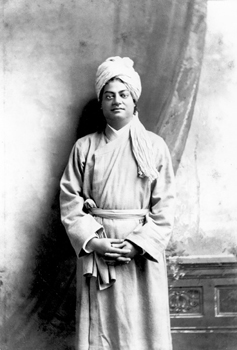
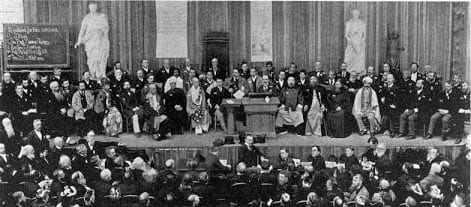
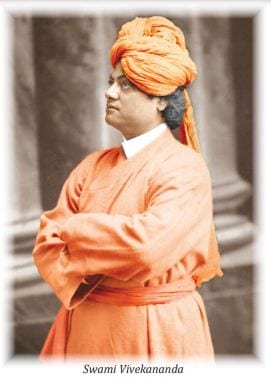
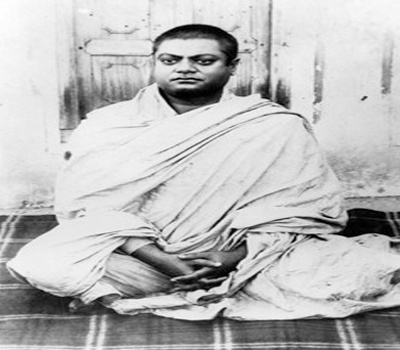

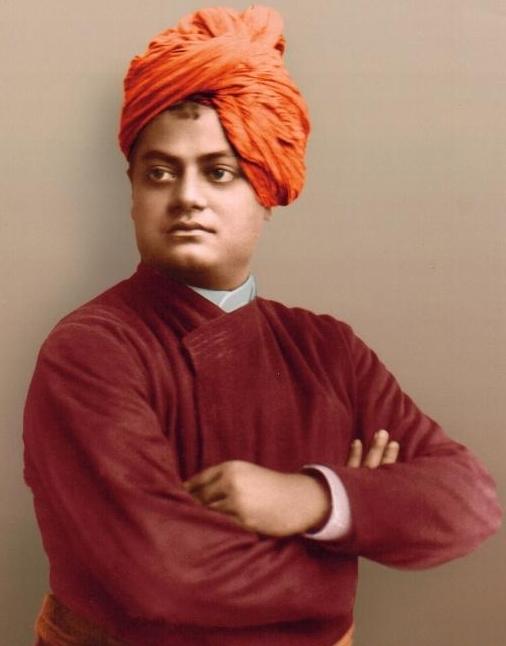
Leave A Comment